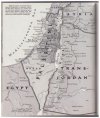2)
- Now we can go to Exodus 6:3 where Yah.weh says :
I appeared
וָאֵרָ֗א (wā·’ê·rā)
Conjunctive waw | Verb - Nifal - Consecutive imperfect - first person common singular
Strong's 7200: To see
to
אֶל־ (’el-)
Preposition
Strong's 413: Near, with, among, to
Abraham,
אַבְרָהָ֛ם (’aḇ·rā·hām)
Noun - proper - masculine singular
Strong's 85: Abraham -- 'exalted father', the father of the Jewish nation
to
אֶל־ (’el-)
Preposition
Strong's 413: Near, with, among, to
Isaac,
יִצְחָ֥ק (yiṣ·ḥāq)
Noun - proper - masculine singular
Strong's 3327: Isaac -- 'he laughs', son of Abraham and Sarah
and to
וְאֶֽל־ (wə·’el-)
Conjunctive waw | Preposition
Strong's 413: Near, with, among, to
Jacob
יַעֲקֹ֖ב (ya·‘ă·qōḇ)
Noun - proper - masculine singular
Strong's 3290: Jacob -- a son of Isaac, also his desc
as God
בְּאֵ֣ל (bə·’êl)
Preposition-b | Noun - masculine singular
Strong's 410: Strength -- as adjective, mighty, the Almighty
Almighty,
שַׁדָּ֑י (šad·dāy)
Noun - proper - masculine singular
Strong's 7706: The Almighty
but I did not
לֹ֥א (lō)
Adverb - Negative particle
Strong's 3808: Not, no
reveal Myself
נוֹדַ֖עְתִּי (nō·w·ḏa‘·tî)
Verb - Nifal - Perfect - first person common singular
Strong's 3045: To know
to them
לָהֶֽם׃ (lā·hem)
Preposition | third person masculine plural
Strong's Hebrew
by My name,
וּשְׁמִ֣י (ū·šə·mî)
Conjunctive waw | Noun - masculine singular construct | first person common singular
Strong's 8034: A name
‘the LORD.’
יְהוָ֔ה (Yah·weh)
Noun - proper - masculine singular
Strong's 3068: LORD -- the proper name of the God of Israel
- There he says he appeared to Abraham, Isaac and Jacob as God Almighty !
- But he didn’t reveal himself to them by His name Yah.weh !
- Now we can go to Exodus 6:3 where Yah.weh says :
I appeared
וָאֵרָ֗א (wā·’ê·rā)
Conjunctive waw | Verb - Nifal - Consecutive imperfect - first person common singular
Strong's 7200: To see
to
אֶל־ (’el-)
Preposition
Strong's 413: Near, with, among, to
Abraham,
אַבְרָהָ֛ם (’aḇ·rā·hām)
Noun - proper - masculine singular
Strong's 85: Abraham -- 'exalted father', the father of the Jewish nation
to
אֶל־ (’el-)
Preposition
Strong's 413: Near, with, among, to
Isaac,
יִצְחָ֥ק (yiṣ·ḥāq)
Noun - proper - masculine singular
Strong's 3327: Isaac -- 'he laughs', son of Abraham and Sarah
and to
וְאֶֽל־ (wə·’el-)
Conjunctive waw | Preposition
Strong's 413: Near, with, among, to
Jacob
יַעֲקֹ֖ב (ya·‘ă·qōḇ)
Noun - proper - masculine singular
Strong's 3290: Jacob -- a son of Isaac, also his desc
as God
בְּאֵ֣ל (bə·’êl)
Preposition-b | Noun - masculine singular
Strong's 410: Strength -- as adjective, mighty, the Almighty
Almighty,
שַׁדָּ֑י (šad·dāy)
Noun - proper - masculine singular
Strong's 7706: The Almighty
but I did not
לֹ֥א (lō)
Adverb - Negative particle
Strong's 3808: Not, no
reveal Myself
נוֹדַ֖עְתִּי (nō·w·ḏa‘·tî)
Verb - Nifal - Perfect - first person common singular
Strong's 3045: To know
to them
לָהֶֽם׃ (lā·hem)
Preposition | third person masculine plural
Strong's Hebrew
by My name,
וּשְׁמִ֣י (ū·šə·mî)
Conjunctive waw | Noun - masculine singular construct | first person common singular
Strong's 8034: A name
‘the LORD.’
יְהוָ֔ה (Yah·weh)
Noun - proper - masculine singular
Strong's 3068: LORD -- the proper name of the God of Israel
- There he says he appeared to Abraham, Isaac and Jacob as God Almighty !
- But he didn’t reveal himself to them by His name Yah.weh !


